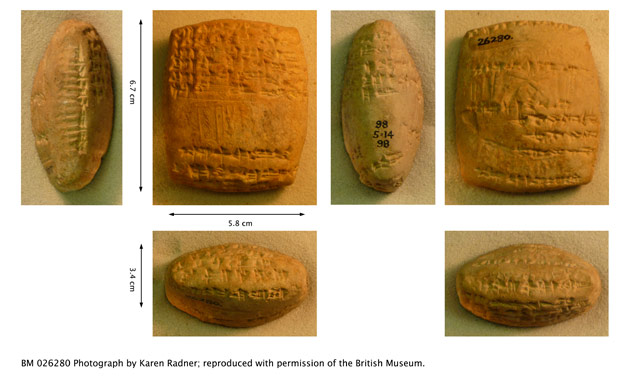BM 026280: interest-free loan of barley

BM 026280: interest-free loan of barley (Nuzi, c.1400 BC). Photograph by Karen Radner; reproduced with permission of the British Museum. View large image.
This private legal text documents a debt of barley owed by a group of three men to Zike (pronounced something like "Zee-kay") who has given them an interest-free loan. The reason for this generosity may be that one of the debtors is Zike's cousin. The document was excavated at Nuzi, a city in the kingdom of Arrapha PGP in the area of modern Kirkuk, northern Iraq. In mid-second millennium BC Nuzi was a vassal state of the kingdom of Mittani, with which it shared its Hurrian culture and language. Nuzi has yielded most of the 5000 known tablets from Arrapha, which is why they are usually called "Nuzi tablets".
The scribes of Arrapha used the cuneiform script and Akkadian for legal and administrative purposes but their usage of the language frequently betrays that they were not native speakers. The shape and formatting of their tablets is also very distinctive. Our document, with its bulbous shape that has no parallels in the Babylonian or Assyrian tradition, is a typical example. Note also how the third to fifth lines of the obverse (front) do not end at the right hand edge of the tablet but continue onto the reverse side. This practice is not at all uncommon for Nuzi texts, but is attested for Babylonian or Assyrian texts in only a handful of cases.
Our tablet is sealed with no less than six cylinder seals: those of the three debtors, the scribe who drafted the document, and the two witnesses. Labels giving their respective names identify each impression. These were added only after the seals had been rolled over the surface of the tablet. Have a close look at the photos to see how the cuneiform script sometimes cuts into the images of the seal impressions.
Unlike Babylonian and Assyrian documents, Nuzi texts are not dated. This poses a considerable challenge for modern researchers, who need to reconstruct the family trees of the people mentioned in the texts in order to establish a basic chronological sequence for the archives. Fortunately, individuals are usually mentioned along with the name of their father, e.g., "Zike son of Šurkitilla" (the creditor in our text), which facilitates this historical recontstuction.
A transliteration and German translation of the text can be found in Müller, Die Londoner Nuzi-Texte (1998), no. 39.
Content last modified on 05 Dec 2016.
Karen Radner
Karen Radner, 'BM 026280: interest-free loan of barley', Knowledge and Power, Higher Education Academy, 2016 [http://oracc.museum.upenn.edu/saao/knpp/cuneiformrevealed/tabletgallery/bm026280/]